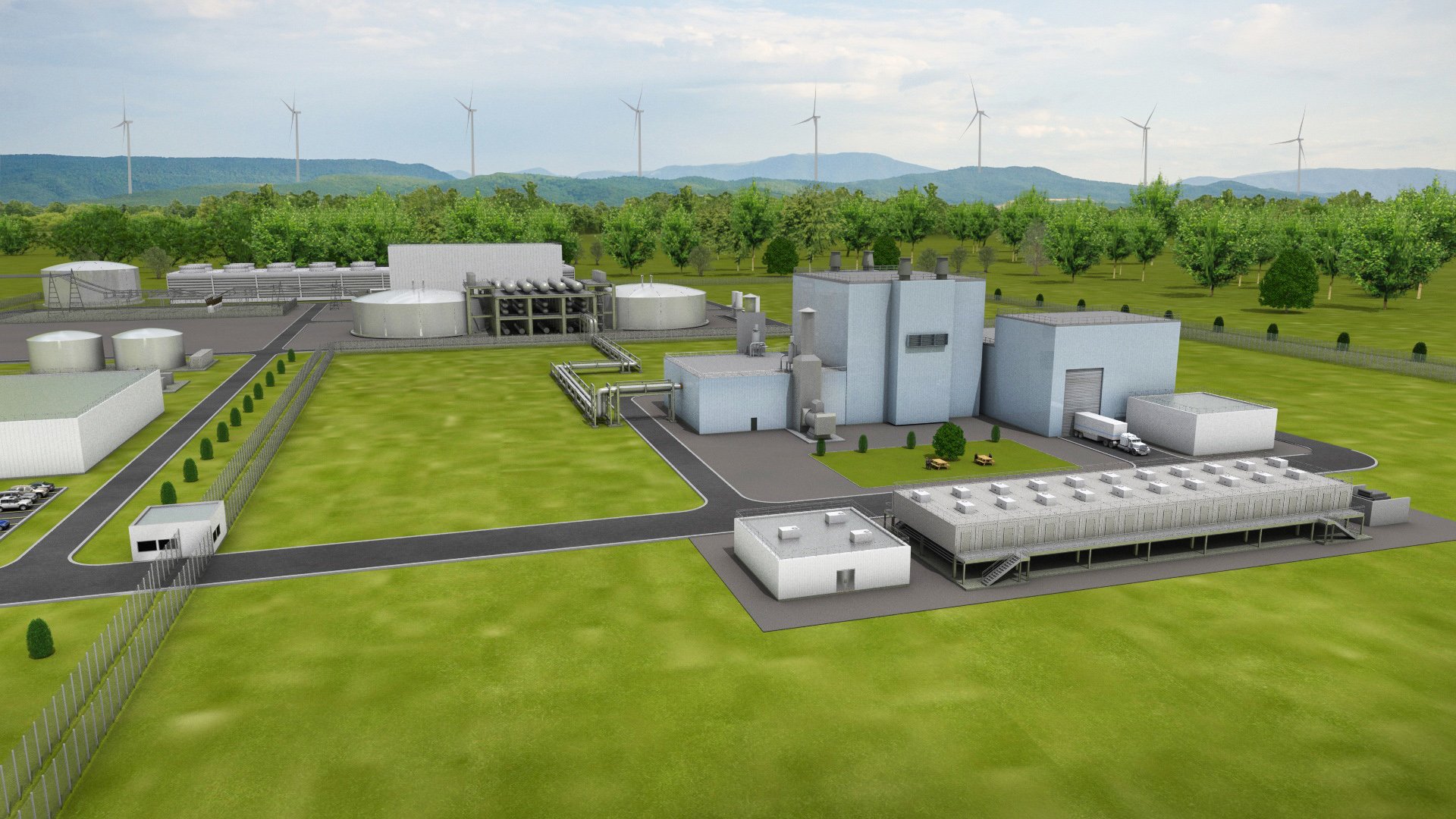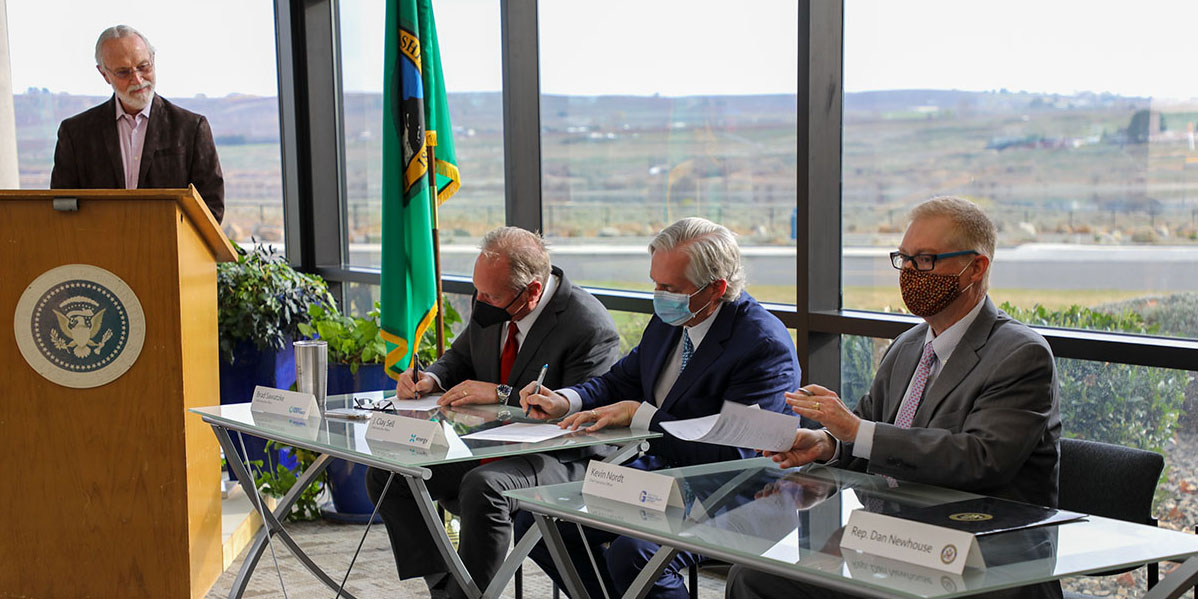Artist's rendition of the Versatile Test Reactor. (Source: DOE)
The Molten Chloride Reactor Experiment will be built at Idaho National Laboratory to demonstrate criticality in a fast-spectrum salt-cooled reactor within five years. (Image: Southern Company)
(Click photo to enlarge) One of 16 AC100M gas centrifuges built by Centrus Energy for HALEU production in Piketon, Ohio. (Photo: Centrus Energy)
For years, pressure has been building for a commercial path to a stable supply of high-assay low-enriched uranium (HALEU)—deemed essential for the deployment of advanced power reactors—but advanced reactor developers and enrichment companies are still watching and waiting. In contrast, the uranium spot price soared after Sprott Physical Uranium Trust, a Canadian investment fund formed in July, began buying up U3O8 supplies, causing the price to increase over 60 percent, topping $50 per pound for the first time since 2012. Fueled by growing acknowledgment that nuclear power is a necessary part of a clean energy future, uranium is the focus of attention from Wall Street to Capitol Hill.
A future TerraPower plant visualization. (Graphic: TerraPower)
TerraPower has a design for a sodium-cooled fast reactor and federal cost-shared demonstration funding from the Department of Energy. Its partner, PacifiCorp, has four operating coal-fired power plants in the state of Wyoming. On June 2, together with Wyoming Gov. Mark Gordon and others, the companies announced plans to site a Natrium reactor demonstration project at a retiring coal plant in Wyoming, with a specific site to be announced by the end of 2021.
May 21, 2021, 2:41PMNuclear NewsCharles Forsberg and Eric Ingersoll TerraPower and GE Hitachi Nuclear Energy jointly developed the sodium-cooled Natrium reactor with the turbine hall, nitrate heat storage tanks, and cooling towers separated from the reactor at the back of the site.
The viability of nuclear power ultimately depends on economics. Safety is a requirement, but it does not determine whether a reactor will be deployed. The most economical reactor maximizes revenue while minimizing costs. The lowest-cost reactor is not necessarily the most economical reactor. Different markets impose different requirements on reactors. If the capital cost of Reactor A is 50 percent more than Reactor B but has characteristics that double the revenue, the most economical reactor is Reactor A.
The most important factor is an efficient supply chain, including on-site construction practices. This is the basis for the low capital cost of light water reactors from China and South Korea. The design of the reactor can significantly affect capital cost through its impact on the supply chain. The question is, how can advanced reactors boost revenue and reduce costs?
An artist’s rendering of Natrium. Image: TerraPower
Around the world, national and local policymakers and business leaders are making bold and ambitious commitments to clean energy goals. In the United States, one in three Americans now lives in a city or state that has committed to or has achieved 100 percent clean electricity, according to the Luskin Center for Innovation at the University of California–Los Angeles.
U.S. Rep. Dan Newhouse (R., Wash.) observes as (from left) Energy Northwest CEO Brad Sawatzke, X-energy CEO Clay Sell, and Grant PUD CEO Kevin Nordt sign the TRi Energy Partnership MOU on April 1 at the Port of Benton in Richland, Wash. Photo: Energy Northwest
Building the nation’s first advanced reactor is the goal of a partnership formed between X-energy, Energy Northwest, and the Grant County (Washington) Public Utility District (PUD).
The TRi Energy Partnership will support the development and demonstration of X-energy’s Xe-100 high-temperature gas reactor, which was selected by the Department of Energy for a cost-shared commercial demonstration by 2027 through the DOE’s Advanced Reactor Demonstration Program (ARDP). The new partnership was announced on April 1, when Clay Sell, X-energy’s chief executive officer; Brad Sawatzke, Energy Northwest’s CEO; and Kevin Nordt, the Grant County PUD’s CEO, met in Richland, Wash., to sign a memorandum of understanding.
An early picture of the research reactor building on the North Carolina State University campus. The Department of Nuclear Engineering is celebrating the 70th anniversary of its nuclear engineering curriculum in 2020–2021. Photo: North Carolina State University
The Department of Nuclear Engineering at North Carolina State University has spent the 2020–2021 academic year celebrating the 70th anniversary of its becoming the first U.S. university to establish a nuclear engineering curriculum. It started in 1950, when Clifford Beck, then of Oak Ridge, Tenn., obtained support from NC State’s dean of engineering, Harold Lampe, to build the nation’s first university nuclear reactor and, in conjunction, establish an educational curriculum dedicated to nuclear engineering.
The department, host to the 2021 ANS Virtual Student Conference, scheduled for April 8–10, now features 23 tenure/tenure-track faculty and three research faculty members. “What a journey for the first nuclear engineering curriculum in the nation,” said Kostadin Ivanov, professor and department head.
Sen Joe Manchin gives his opening statement at the March 25 hearing.
The Senate Energy and Natural Resources Committee yesterday held a hearing to examine the latest developments in the U.S. nuclear energy sector, with a focus on ways to maintain and expand the use of nuclear in the United States and abroad.
Testifying before the committee were Jeffrey Lyash, president and chief executive officer of the Tennessee Valley Authority (TVA); Chris Levesque, president and CEO of TerraPower, Scott Melbye, president of Uranium Producers of America (UPA); Amy Roma, founding member of the Atlantic Council’s Nuclear Energy and National Security Coalition and a partner with the law firm Hogan Lovells; and J. Clay Sell, CEO of X-energy.













 The North Carolina State University (NCSU) Libraries Department and the Department of Nuclear Engineering are collaborating to build
The North Carolina State University (NCSU) Libraries Department and the Department of Nuclear Engineering are collaborating to build 


 ANSI/ASME/ANS RA-S-1.4-2021, “Probabilistic Risk Assessment Standard for Advanced Non-Light Water Reactor Nuclear Power Plants,” has just been issued. Approved by the American National Standards Institute (ANSI) on January 28, 2021, this joint American Society of Mechanical Engineers (ASME)/American Nuclear Society (ANS) standard sets forth requirements for probabilistic risk assessments (PRAs) used to support risk-informed decisions for commercial nuclear power plants and prescribes a method for applying these requirements for specific applications.
ANSI/ASME/ANS RA-S-1.4-2021, “Probabilistic Risk Assessment Standard for Advanced Non-Light Water Reactor Nuclear Power Plants,” has just been issued. Approved by the American National Standards Institute (ANSI) on January 28, 2021, this joint American Society of Mechanical Engineers (ASME)/American Nuclear Society (ANS) standard sets forth requirements for probabilistic risk assessments (PRAs) used to support risk-informed decisions for commercial nuclear power plants and prescribes a method for applying these requirements for specific applications.
